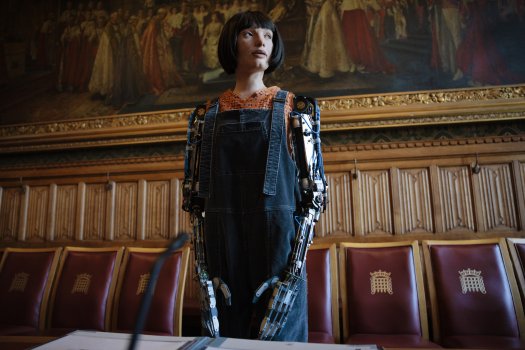Opinion polls show that people are growing increasingly uneasy about artificial intelligence, and yet the technology is expanding into almost every walk of life and becoming more and more embedded in the way we live.
So how do we bring greater transparency to how AI works and help to allay people’s fears? Peter Scott is the founder of the Next Wave Institute and the author of Artificial Intelligence and You.
SCOTT: Fear might be justified, but it’s not productive. If you’re attacked by a tiger rushing at you, you’re justified in feeling fear. But if that causes you to remain paralyzed or not do whatever you’re supposed to do when a tiger comes at you, then it doesn’t help.
What I find is that the fear people have of an AI future is proportional to how little agency they perceive that they have. They feel like they’re being taken on a ride by technology companies that don’t know where they’re going and who are driving a car at breakneck speed down the highway, while everyone else sits in the backseat terrified. And when I talk to technologists, I try to make them aware that their natural enthusiasm can create this response.
It Looks Like Magic
Arthur C. Clarke’s third law was that any sufficiently advanced technology is indistinguishable from magic. And to people looking at what AI is doing today, with things like the large language models, or the amazing image synthesis tools, it does look magical. But when we see AI doing one kind of magic, we assume that it can do all kinds of magic, because how are we supposed to know where the boundaries are?
So we instantly jump to the idea of AI being a threat, or becoming conscious, or running amok. And all of those things are relatively unlikely. Mostly what AI is doing at the moment is exposing the fact that a lot of the things that we do cognitively as humans can be achieved by narrow artificial intelligence using its capability for finding patterns.
And the more familiar you get with it, the more you can understand that what’s going on is this pattern-finding. There’s this cognitive mismatch between what we’ve been told to expect any day now and what’s realistic. Most roboticists say that AI is not going to become generally intelligent until it understands the real world as well as we do.
Continue reading: https://www.brinknews.com/how-to-stop-being-scared-of-ai-and-learn-to-love-it/
So how do we bring greater transparency to how AI works and help to allay people’s fears? Peter Scott is the founder of the Next Wave Institute and the author of Artificial Intelligence and You.
SCOTT: Fear might be justified, but it’s not productive. If you’re attacked by a tiger rushing at you, you’re justified in feeling fear. But if that causes you to remain paralyzed or not do whatever you’re supposed to do when a tiger comes at you, then it doesn’t help.
What I find is that the fear people have of an AI future is proportional to how little agency they perceive that they have. They feel like they’re being taken on a ride by technology companies that don’t know where they’re going and who are driving a car at breakneck speed down the highway, while everyone else sits in the backseat terrified. And when I talk to technologists, I try to make them aware that their natural enthusiasm can create this response.
It Looks Like Magic
Arthur C. Clarke’s third law was that any sufficiently advanced technology is indistinguishable from magic. And to people looking at what AI is doing today, with things like the large language models, or the amazing image synthesis tools, it does look magical. But when we see AI doing one kind of magic, we assume that it can do all kinds of magic, because how are we supposed to know where the boundaries are?
So we instantly jump to the idea of AI being a threat, or becoming conscious, or running amok. And all of those things are relatively unlikely. Mostly what AI is doing at the moment is exposing the fact that a lot of the things that we do cognitively as humans can be achieved by narrow artificial intelligence using its capability for finding patterns.
And the more familiar you get with it, the more you can understand that what’s going on is this pattern-finding. There’s this cognitive mismatch between what we’ve been told to expect any day now and what’s realistic. Most roboticists say that AI is not going to become generally intelligent until it understands the real world as well as we do.
Continue reading: https://www.brinknews.com/how-to-stop-being-scared-of-ai-and-learn-to-love-it/

